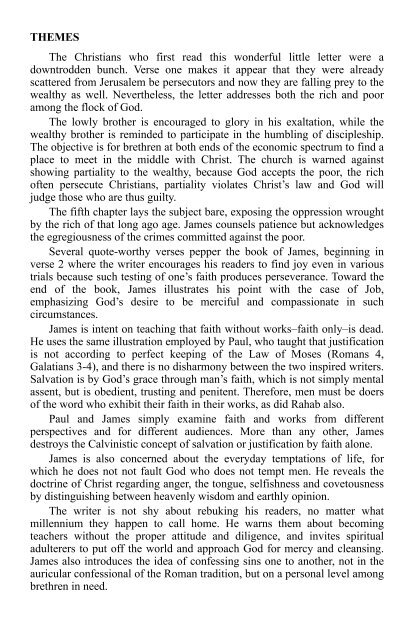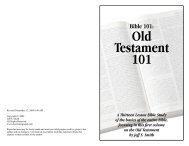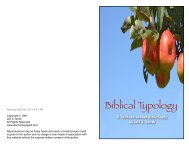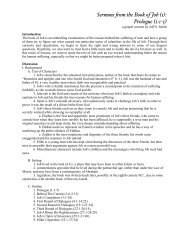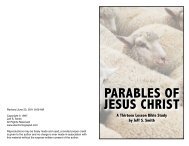New Testament Study Guides - ElectronicGospel
New Testament Study Guides - ElectronicGospel
New Testament Study Guides - ElectronicGospel
Create successful ePaper yourself
Turn your PDF publications into a flip-book with our unique Google optimized e-Paper software.
THEMES<br />
The Christians who first read this wonderful little letter were a<br />
downtrodden bunch. Verse one makes it appear that they were already<br />
scattered from Jerusalem be persecutors and now they are falling prey to the<br />
wealthy as well. Nevertheless, the letter addresses both the rich and poor<br />
among the flock of God.<br />
The lowly brother is encouraged to glory in his exaltation, while the<br />
wealthy brother is reminded to participate in the humbling of discipleship.<br />
The objective is for brethren at both ends of the economic spectrum to find a<br />
place to meet in the middle with Christ. The church is warned against<br />
showing partiality to the wealthy, because God accepts the poor, the rich<br />
often persecute Christians, partiality violates Christ’s law and God will<br />
judge those who are thus guilty.<br />
The fifth chapter lays the subject bare, exposing the oppression wrought<br />
by the rich of that long ago age. James counsels patience but acknowledges<br />
the egregiousness of the crimes committed against the poor.<br />
Several quote-worthy verses pepper the book of James, beginning in<br />
verse 2 where the writer encourages his readers to find joy even in various<br />
trials because such testing of one’s faith produces perseverance. Toward the<br />
end of the book, James illustrates his point with the case of Job,<br />
emphasizing God’s desire to be merciful and compassionate in such<br />
circumstances.<br />
James is intent on teaching that faith without works–faith only–is dead.<br />
He uses the same illustration employed by Paul, who taught that justification<br />
is not according to perfect keeping of the Law of Moses (Romans 4,<br />
Galatians 3-4), and there is no disharmony between the two inspired writers.<br />
Salvation is by God’s grace through man’s faith, which is not simply mental<br />
assent, but is obedient, trusting and penitent. Therefore, men must be doers<br />
of the word who exhibit their faith in their works, as did Rahab also.<br />
Paul and James simply examine faith and works from different<br />
perspectives and for different audiences. More than any other, James<br />
destroys the Calvinistic concept of salvation or justification by faith alone.<br />
James is also concerned about the everyday temptations of life, for<br />
which he does not not fault God who does not tempt men. He reveals the<br />
doctrine of Christ regarding anger, the tongue, selfishness and covetousness<br />
by distinguishing between heavenly wisdom and earthly opinion.<br />
The writer is not shy about rebuking his readers, no matter what<br />
millennium they happen to call home. He warns them about becoming<br />
teachers without the proper attitude and diligence, and invites spiritual<br />
adulterers to put off the world and approach God for mercy and cleansing.<br />
James also introduces the idea of confessing sins one to another, not in the<br />
auricular confessional of the Roman tradition, but on a personal level among<br />
brethren in need.


